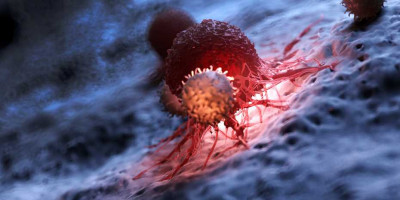
An active immune system plays an important role in stopping cancer progression by identifying tumour cells and targeting them for destruction.
Any deviation in the normal activities of the immune system could lead to accelerated tumour growth.
Moffitt Cancer Center researchers wanted to determine how myeloid cells, a type of immune cell, contribute to the progression of cancer.
In a new article published today in the journal Immunity, the Moffit team reveals how protein-signalling pathways associated with cellular stress processes turn myeloid cells into tumour-promoting players and suggests that targeting the PERK protein may be an effective therapeutic approach to reactivate the immune system and boost the effectiveness of immunotherapy.
Myeloid cells are involved in the anti-cancer activity of the immune system.
However, in most patients with advanced malignancies, myeloid cell pathways become altered and can transform into myeloid-derived suppressor cells (MDSCs) that inhibit protective anti-tumour immunity.
These MDSCs expand in cancer patients and turn on signalling pathways that deactivate the effective destruction of tumour cells by other immune populations.
Studies have shown that high numbers of MDSCs correlate with poor outcomes and drug resistance in many cancer patients.
MDSCs also promote metastatic spreading by forming favourable niches for sprouted tumour cells.
These observations suggest that targeting MDSCs may be a viable approach to re-stimulate the immune system to target cancer cells; however, scientists do not completely understand how MDSCs function in the tumour environment and no effective strategies to block their activity currently exist.
Moffitt researchers aimed to identify central molecular mechanisms of how MDSCs contribute to tumour progression.
The team performed a series of pre-clinical studies to determine how the protein kinase PERK contributes to MDSC activity.
They discovered that active PERK levels were higher in the MDSCs from animals and patients with metastatic non-small cell lung carcinoma and ovarian cancer when compared to normal lung and ovarian tissue, suggesting that there may be an association between active PERK in MDSCs and cancer development.
In order to more clearly define the role of PERK in tumour progression, the Moffitt researchers created a mouse model that was lacking the PERK gene in MDSCs to determine the effect of its loss on immune cell activity.
They discovered that deletion of PERK reprogrammed MDSCs into cells that reactivated the anti-tumour activity of T cells, other immune cells, which could identify and target tumour cells for destruction.
The researchers also identified the molecular pathway that led from PERK to T-cell activation and demonstrated that treatment of mice with drugs that inhibit PERK reduced tumour growth, suggesting that targeting the PERK protein may be an effective approach in cancer patients.
"Our findings demonstrate the pivotal role of PERK in tumour-MDSC functionality and unveil strategies to reprogram myeloid cells in cancer patients from an immunosuppressive to an immunostimulatory cell type that boosts cancer immunotherapy" said Paulo Rodriguez, Ph.D., associate member of the Department of Immunology at Moffitt.
"Despite these encouraging data, further research evaluating the activity of PERK inhibitors is warranted, as we anticipate that the dose, treatment period, route, and bioavailability could regulate their therapeutic vs. toxic effects."
Source: Moffitt Cancer Center
The World Cancer Declaration recognises that to make major reductions in premature deaths, innovative education and training opportunities for healthcare workers in all disciplines of cancer control need to improve significantly.
ecancer plays a critical part in improving access to education for medical professionals.
Every day we help doctors, nurses, patients and their advocates to further their knowledge and improve the quality of care. Please make a donation to support our ongoing work.
Thank you for your support.